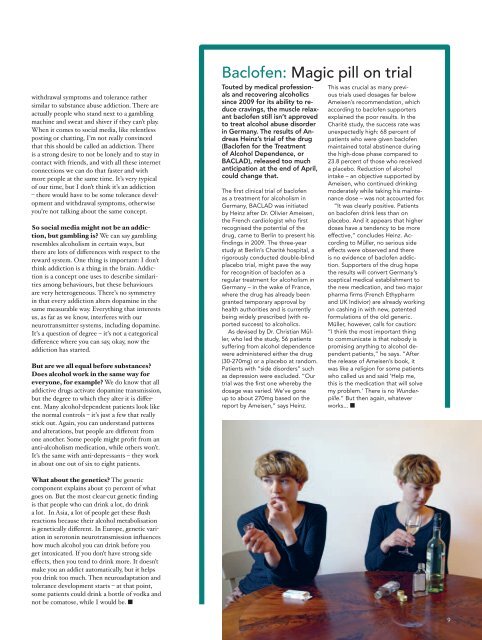Create successful ePaper yourself
Turn your PDF publications into a flip-book with our unique Google optimized e-Paper software.
withdrawal symptoms and tolerance rather<br />
similar to substance abuse addiction. There are<br />
actually people who stand next to a gambling<br />
machine and sweat and shiver if they can’t play.<br />
When it comes to social media, like relentless<br />
posting or chatting, I’m not really convinced<br />
that this should be called an addiction. There<br />
is a strong desire to not be lonely and to stay in<br />
contact with friends, and with all these internet<br />
connections we can do that faster and with<br />
more people at the same time. It’s very typical<br />
of our time, but I don’t think it’s an addiction<br />
– there would have to be some tolerance development<br />
and withdrawal symptoms, otherwise<br />
you’re not talking about the same concept.<br />
So social media might not be an addiction,<br />
but gambling is? We can say gambling<br />
resembles alcoholism in certain ways, but<br />
there are lots of differences with respect to the<br />
reward system. One thing is important: I don’t<br />
think addiction is a thing in the brain. Addiction<br />
is a concept one uses to describe similarities<br />
among behaviours, but these behaviours<br />
are very heterogeneous. There’s no symmetry<br />
in that every addiction alters dopamine in the<br />
same measurable way. Everything that interests<br />
us, as far as we know, interferes with our<br />
neurotransmitter systems, including dopamine.<br />
It’s a question of degree – it’s not a categorical<br />
difference where you can say, okay, now the<br />
addiction has started.<br />
But are we all equal before substances?<br />
Does alcohol work in the same way for<br />
everyone, for example? We do know that all<br />
addictive drugs activate dopamine transmission,<br />
but the degree to which they alter it is different.<br />
Many alcohol-dependent patients look like<br />
the normal controls – it’s just a few that really<br />
stick out. Again, you can understand patterns<br />
and alterations, but people are different from<br />
one another. Some people might profit from an<br />
anti-alcoholism medication, while others won’t.<br />
It’s the same with anti-depressants – they work<br />
in about one out of six to eight patients.<br />
Baclofen: Magic pill on trial<br />
Touted by medical professionals<br />
and recovering alcoholics<br />
since 2009 for its ability to reduce<br />
cravings, the muscle relaxant<br />
baclofen still isn’t approved<br />
to treat alcohol abuse disorder<br />
in Germany. The results of Andreas<br />
Heinz’s trial of the drug<br />
(Baclofen for the Treatment<br />
of Alcohol Dependence, or<br />
BACLAD), released too much<br />
anticipation at the end of April,<br />
could change that.<br />
The first clinical trial of baclofen<br />
as a treatment for alcoholism in<br />
Germany, BACLAD was initiated<br />
by Heinz after Dr. Olivier Ameisen,<br />
the French cardiologist who first<br />
recognised the potential of the<br />
drug, came to Berlin to present his<br />
findings in 2009. The three-year<br />
study at Berlin’s Charité hospital, a<br />
rigorously conducted double-blind<br />
placebo trial, might pave the way<br />
for recognition of baclofen as a<br />
regular treatment for alcoholism in<br />
Germany – in the wake of France,<br />
where the drug has already been<br />
granted temporary approval by<br />
health authorities and is currently<br />
being widely prescribed (with reported<br />
success) to alcoholics.<br />
As devised by Dr. Christian Müller,<br />
who led the study, 56 patients<br />
suffering from alcohol dependence<br />
were administered either the drug<br />
(30-270mg) or a placebo at random.<br />
Patients with “side disorders” such<br />
as depression were excluded. “Our<br />
trial was the first one whereby the<br />
dosage was varied. We’ve gone<br />
up to about 270mg based on the<br />
report by Ameisen,” says Heinz.<br />
This was crucial as many previous<br />
trials used dosages far below<br />
Ameisen’s recommendation, which<br />
according to baclofen supporters<br />
explained the poor results. In the<br />
Charité study, the success rate was<br />
unexpectedly high: 68 percent of<br />
patients who were given baclofen<br />
maintained total abstinence during<br />
the high-dose phase compared to<br />
23.8 percent of those who received<br />
a placebo. Reduction of alcohol<br />
intake – an objective supported by<br />
Ameisen, who continued drinking<br />
moderately while taking his maintenance<br />
dose – was not accounted for.<br />
“It was clearly positive. Patients<br />
on baclofen drink less than on<br />
placebo. And it appears that higher<br />
doses have a tendency to be more<br />
effective,” concludes Heinz. According<br />
to Müller, no serious side<br />
effects were observed and there<br />
is no evidence of baclofen addiction.<br />
Supporters of the drug hope<br />
the results will convert Germany’s<br />
sceptical medical establishment to<br />
the new medication, and two major<br />
pharma firms (French Ethypharm<br />
and UK Indivior) are already working<br />
on cashing in with new, patented<br />
formulations of the old generic.<br />
Müller, however, calls for caution:<br />
“I think the most important thing<br />
to communicate is that nobody is<br />
promising anything to alcohol dependent<br />
patients,” he says. “After<br />
the release of Ameisen’s book, it<br />
was like a religion for some patients<br />
who called us and said ‘Help me,<br />
this is the medication that will solve<br />
my problem.’ There is no Wunderpille.”<br />
But then again, whatever<br />
works... n<br />
What about the genetics? The genetic<br />
component explains about 50 percent of what<br />
goes on. But the most clear-cut genetic finding<br />
is that people who can drink a lot, do drink<br />
a lot. In Asia, a lot of people get these flush<br />
reactions because their alcohol metabolisation<br />
is genetically different. In Europe, genetic variation<br />
in serotonin neurotransmission influences<br />
how much alcohol you can drink before you<br />
get intoxicated. If you don’t have strong side<br />
effects, then you tend to drink more. It doesn’t<br />
make you an addict automatically, but it helps<br />
you drink too much. Then neuroadaptation and<br />
tolerance development starts – at that point,<br />
some patients could drink a bottle of vodka and<br />
not be comatose, while I would be. n<br />
9


















